Dickens, Writ Klingon
Rob Callahan talks with the cast of a Star Trek-themed holiday production of the "A Christmas Carol," delivered entirely in Klingon, and gives curious theater-goers the primer they need to go from Scrooge to SQuja'
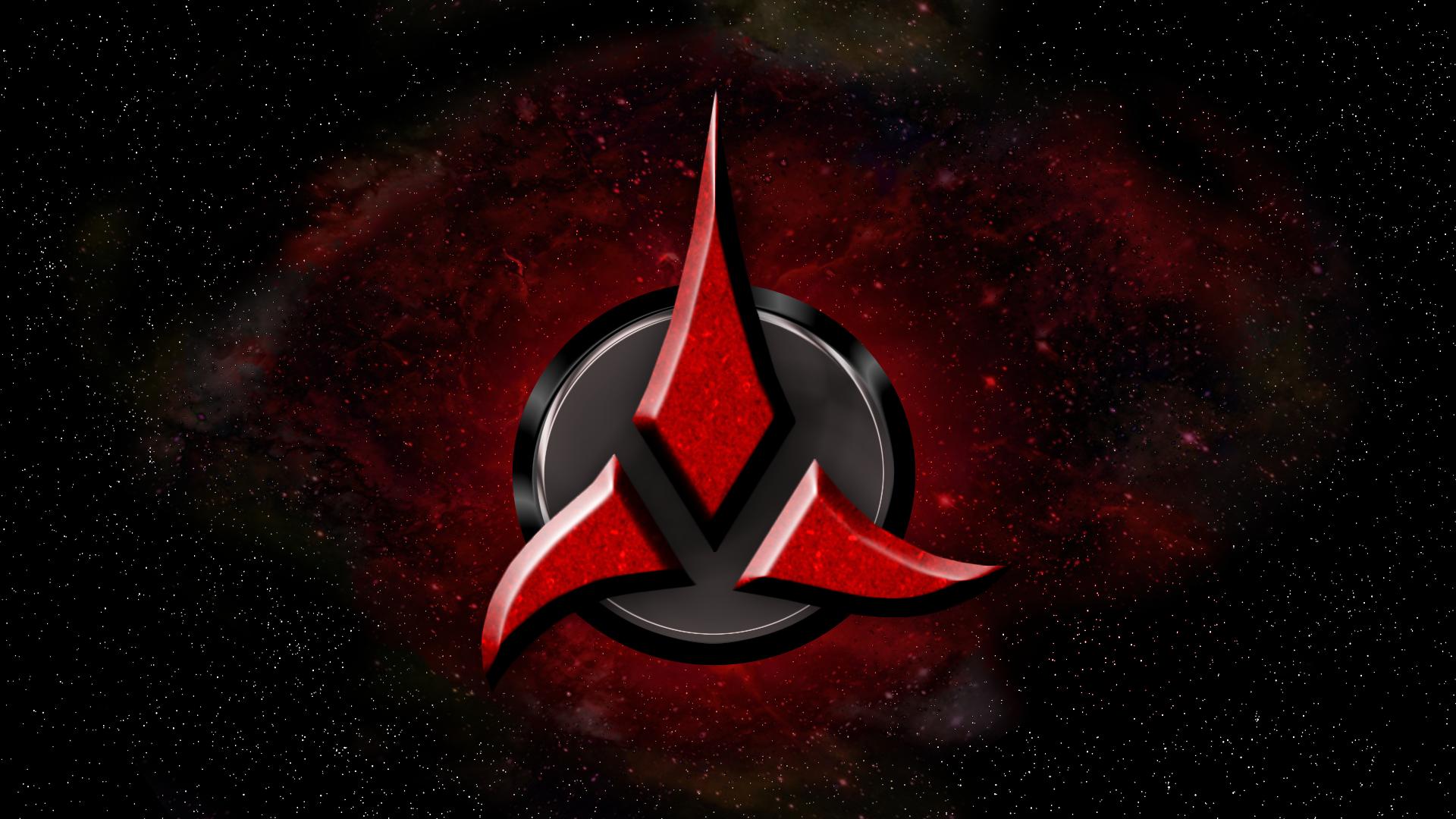
So, you hear there’s a production of A Christmas Carol going, over on Saint Paul’s East Side. You also hear it’s Star Trek-themed, and that it’s presented in “the original Klingon.”
“Self,” you say to yourself, “are they out of their Vulcan minds?”
Then you sort of settle into the idea and consider the ways in which the Dickens classic could blend with what we’ve come to know as Klingon culture through Star Trek: The Next Generation and Deep Space Nine. It’s a story about overcoming cowardice, abandoning selfishness, setting aside greed, making a sacrifice, practicing nobility, and having honor. If you’re unfamiliar with the human version of this tale, it’s in the public domain. If you’re unfamiliar with Klingons, well…
Obligatory #Fansplaining
In Star Trek, the Klingons are a ritualistic race of warriors who prize honor above all else. They prize violence a close second, though, and violence begets honor under most circumstances. If you’re honorable, you go to Sto’Vo’Kor when you die. Although it’s considered Klingon heaven, it’s more accurately described as angry Valhalla. If you’re dishonorable, you go to Gre’thor. which is pretty much Klingon hell. The most legendary warrior of them all was the Klingon emperor Kahless the Unforgettable. The stories, poems, songs, and operas which commemorate his feats are some of the highest forms of Klingon art. According to legend, he would have made even Kirk wet his pants a little.
Also, their ceremonial melee weapons are Bat’leths. Any questions so far? Good.
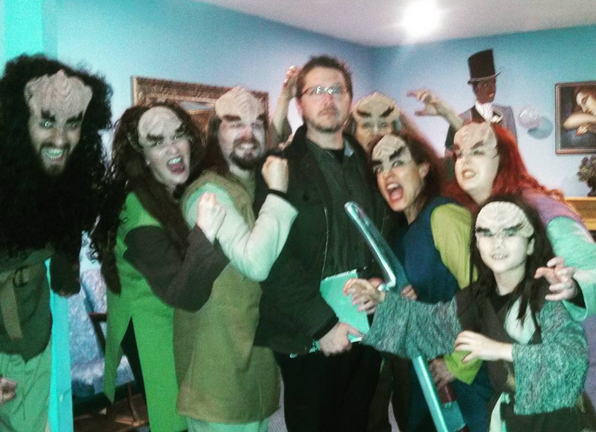
If that’s all you know about Klingons, you know enough to see this show. That’s enough to cover the main differences between this interpretation and most of the others you’ll see: Instead of an old man’s battle with selfishness, it is a battle with dishonor. Instead of the Ghosts of Christmas, the protagonist cavorts with the Ghosts of Kahless. The show is well saturated with plenty of jokes and references meant solely for Trek fans, but beyond these points it is still what you expect: It is A Christmas Carol.
I don’t want to give this show the standard review. Let’s focus on the cast. After a recent performance, I tracked a few of them down: Kelvin Hatle (SQuja’, the Klingon Scrooge,) Lana Rosario (The Ghost of Kahless Past,) Gillian Chan (tImHom, or Tiny Tim,) and Dawn Krosnowski (the Vulcan narrator) all sat down with me to talk about their roles, and what drew them to this production.
From Scrooge to SQuja’
Hatle, an established local character actor, joins the cast for the first time this year, taking to the role like a Targ takes to the forests of Q’onoS. “I’ve never done this show before,” he says. “I’ve never even been in a production of A Christmas Carol before.” So, when asked how he prepared for the story’s leading role, he jokes, “It’s not like I’m unfamiliar with the story.” Then he considers the more obvious side of the question, and adds, “Honestly just speaking the language is like 90 percent of it. It’s so percussive and meaty and violent-sounding, that I just went with that.”
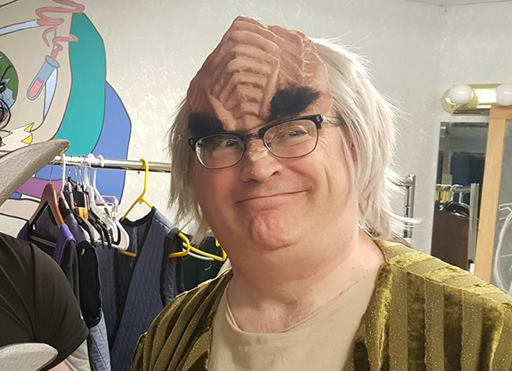
“It was one of the more nerve-wracking openings I’ve ever done,” he admits. “Trying to memorize this stuff is a whole other level of difficulty. For all practical intents and purposes, you’re memorizing it phonetically, and I’ve never really tried to do that before. It’s like a whole other area of the brain.”
“He’s in practically every scene, too,” adds Chan.
“Yeah, I have three or four times as many lines as anyone else.”
He didn’t know the language before taking the role, although like any self-respecting fan he purchased The Klingon Dictionary when it was published in 1992. “But I didn’t memorize it,” he admits. “I knew what “nuqneH” and “Quapla’” meant, but that’s about it.”
“Because you had friends who would annoy you with that,” says Rosario, “because they were in the show before this.”
Christmas Spirits
There is no ghost of Christmas among the Klingons; there is only the spirit of Kahless, which presents a unique costuming opportunity: Because the Klingons’ appearance has changed so drastically throughout the course of the Star Trek franchise’s run, there are three distinct Trek eras to evoke with the appearance of Kahless. Kahless Past appears as one of the 1960s Klingons, who were generally olive-skinned humans. The men wore flamboyant goatees and the woman wore their hair in beehives. Kahless Present appears as the distinctly alien-looking Klingons popularized during the Next Generation era, resplendent in forehead ridges and tangled hair, adorned in garb befitting a viking samurai. Kahless Future looks like the henchmen from some J.J. Abrams film we don’t talk about.
“I love the role,” says Rosario of her portrayal of Kahless Past. It’s a role with a lot of personality, as the Klingons of the 60s were known for their swagger and bravado. “She’s so wonderfully snarky, and Jessica really outdid herself with the wig this year. It’s beautiful.”
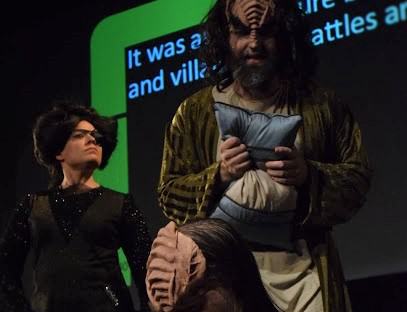
“I love that 60s-esque kind of wig,” echoes Hatle.
“Yeah,” she says. “You grow up with the old Star Trek and it feels so great. I get a little giddy. Especially when I’m holding the disruptor.”
Now in her second year as a Spirit of Kahless, Rosario doubles up on parts when she’s out of the beehive wig, playing another mortal Klingon with a short singing role. “If you could call it that,” the trained singer says of what Klingons call singing. “The first couple of years that I sang in Klingon, I kept being told, ‘Stop trying to be pretty.’ So, it’s pretty much how ugly can I make this without hurting myself?”
“Yeah,” says Hatle, “it’s more chanting.”
“Kind of grunty,” she adds.
The Heart of the Warrior
No matter which version of A Christmas Carol you see; be it the lackluster Human version, that of the noble Klingons, or even the dishonorable interpretation of those Romulan petaQ, there’s a point at which you’ll probably wipe a tear or two from your eyes. And that’s the point, in the Klingon version, at which tImHom’s fate is revealed. His human counterpart, Tim, dies from a lack of resources and basic care in the Dickens classic. For the Klingons, a tragic demise befitting the great warriors of old awaits him.
tImHom is small and frail, and in no way physically prepared for the Klingon rites of passage he must endure to become a warrior, but he is determined to carry himself with honor and fight to the death if necessary. Only then will he avoid bringing shame on his house. If only his father had more time to train him, to teach him the art of combat, he might stand a chance. But the dishonorable SQuja’, who himself avoided these rites as a young man, will not grant tImHom’s father any time off from work. So, it seems, tiny tImHom is fated to die proving himself in battle.
Gillian Chan reprises her role of tImHom for the second year. The young actress, who also acted in Six Elements’ 2015 production of Hapgood, first joined the cast as SQuja’s younger sister, “van,” before taking on her current, larger role. In addition to acting, Chan often cosplays favorite characters from sci-fi and fantasy fandom, among them Legend of Zelda’s Link and Star Wars’ Rey, so she comes naturally to the idea of getting into heavy alien makeup and prosthetics for the show.
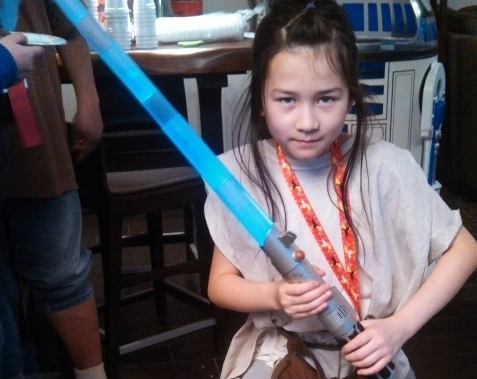
When I ask if she enjoys playing tImHom, she gives a slight shrug and a casual, “Yeah…” The other cast members burst into laughter over her apparent nonchalance, much to Chan’s consternation. She demands to know what’s so funny, then Rosario turns to the others and says, “Well, she’s gotta put up with us. What do you want?”
“Well,” adds Chan, recovering some enthusiasm and proudly brandishing her weapon, “they gave me a Bat’leth!” Otherwise, she stays consistently cool and casual while we talk about the show. When asked if she knew any Klingon before learning her lines, she simply says, “Nope. Not really.” Then adds, “Unless you’re counting insults.”
The Universal Translator
As the Vulcan narrator, the cast’s only non-Klingon member, Krosnowski, helps interpret some of the show’s more alien moments for the human audience, but she’s quick to point out that the story already works very well without the help. “I think it’s the way the story was translated,” she says. “I mean if you just look at the basic idea that Scrooge is a jerk and no one likes him, but now it’s translated to how Scrooge lost his honor. That amps it up so much, because SQuja’ is going to live in horror for the rest of his life, and his afterlife is going to suck.”
“He’s going to Klingon Hell,” says Chan.
“So, that’s why it’s so important to fight for it,” says Krosnowski. “Just like the human Scrooge had to fight for his humanity. SQouja’ fights for his Klingonity.”
“Whatever that would be,” adds Chan.
“That’s a word,” says Dawn. “At least it is now.”
“His Klingonocity,” Hatle offers.
As the exchange tangents, it becomes clear that some things could very well get lost in translation without the intermediary voice of the Vulcan narrator to pause and provide an occasional English break in the otherwise all-Klingon dialogue. And on that note, I start to wonder about the response from non-fans. How do those who can’t tell a Tribble from a Trill handle the show’s Trek-centric tack?
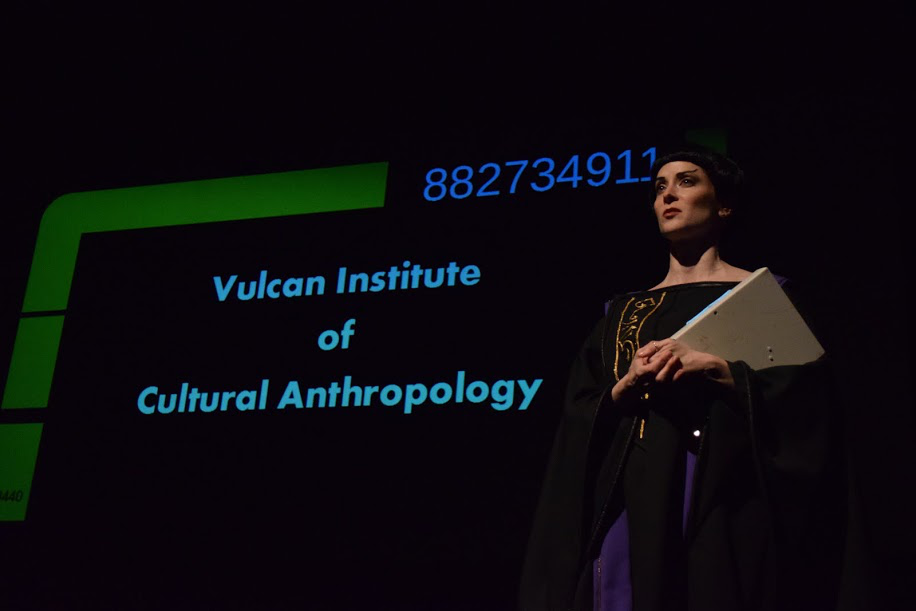
“I do get some feedback,” Krosnowski says, “especially from my mother, who has no idea what’s going on even though she’s seen the show now three times. She’s like, ‘Everyone’s yelling, that’s great! The fights are fun. I like the costumes,’ and that’s about as far as it goes, at least for my mom.”
“My husband’s in the same boat,” says Rosario, “He’s like ‘I don’t really know much about [Star Trek] but it was fun.’”
And while non-fans may pepper every night’s audience, there are none in the cast. There, several generations come together to celebrate their long held respective loves of Klingon culture through this new-fashioned take on Dickens’ most popular ghost story.
“I watched Star Trek off and on,” says Chan, the youngest of the group, recalling her introduction to Trek fandom. “I watched the Next Generation.”
Hatle, the oldest, adds. “Star Trek is probably my first geek memory. Somewhere, buried someplace, my dad has – of all things – a reel to reel audio tape of me watching Star Trek when I was like three.”
Krosnowski exclaims, “What?”
“Awww,” says Rosario.
“I’m just sort of playing around, and you can hear it in the background,” he explains, “and I guess I’m playing along with it or something. And I am just old enough that that was probably when it was still on NBC. It probably would’ve been season 3. It was my first, earliest, geek love and fascination.”
Each cast member’s geek love shines in this production, which is performed almost entirely in Klingon, with subtitles projected above the action. And it’s that love that really sells a story and a performance you may think you’ve seen before, but you haven’t. At least not like this. As any member of this warrior race will insist, the classics lose a certain something when performed in any language other than their original Klingon.
Noted performance details: A Klingon Christmas Carol continues at the Historic Mounds Theatre in Saint Paul with performances December 9, 10, 16, 17 and 23 at 7:30 pm; and December 11 and 18 at 4:30 pm.